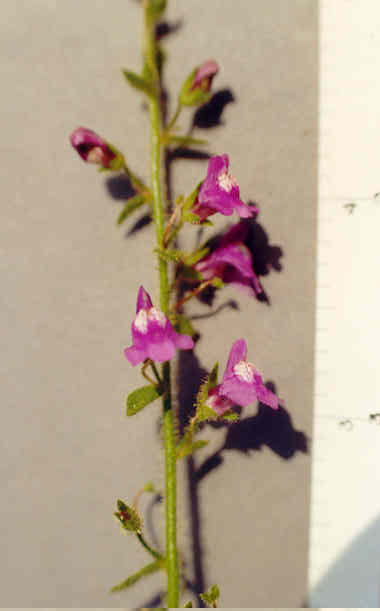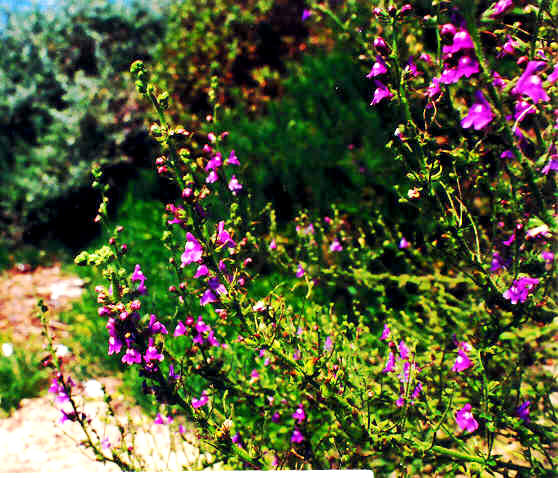
 |
Antirrhinum nuttallianum Benth. ssp. subsessile (A. Gray) D. ThompsonScrophulariaceae (Figwort Family)NativeWild SnapdragonNuttall's Snapdragon |
June Photo
Plant
Characteristics:
Annual or biennial, stems erect but weak, often clinging to other pls. or
debris, hairs sparse to moderately dense, coarse, of +/- uniform length, tips
much enlarged; lvs. opposite at lowest 2-5 nodes of main stem; fls. at all
1-lvd. nodes, solitary; upper pedicels generally less than 6 mm.; calyx lobes
+/- equal; corolla of opening fls. 7-12 mm., whitish blotch on lower corolla lip
generally interrupted by lavender, unique to California are the gold hairs in
the mouth; seed ridges broken, fragments longitudinal or unpatterned.
Habitat: Common in dry, especially
disturbed places, below 2500 ft.; Coastal Sage Scrub, Chaparral; L. Calif. to
Santa Barbara Co., San Clemente, Santa Rosa, Santa Cruz Ids.
(Munz, Flora So. Calif. 793).
0-1400 m. Bloom period not listed in Munz.
Name: Greek, anti, like
and rhinon, nose because of snoutlike fls.
(Munz, Flora So. Calif. 791).
The species is named in honor of Thomas Nuttall, 1786-1859,
English-American ornithologist and botanist, once curator of the Harvard
botanical gardens. Nuttall was the
naturalist "Old Curious" of Dana's homeward voyage, commemorated in Two
Years Before the Mast. (Jaeger
313). Latin, sub, prefix
meaning almost. (Jaeger 251).
Sessile, without a pedicel, peduncle or petiole.
(Hickman 24). Subsessile,
with a short pedicel, referring to the characteristic that gives the ssp. its
name. (my comment).
General: Uncommon in the study area.
Found only on the Castaway's bluffs and the bluffs just easterly of the
Delhi ditch. Seems to grow only in
the wetter years. Found in Big
Canyon in 1995. (my comments). Delfina Cuero, a Kumeyaay or Southern
Diegueno Indian, made the following comments about Antirrhinum nuttallianum
in her autobiography: "We made
tea for colds by gathering purple flowers.
Boiled it and added a little oil, now olive oil, and drink."
(Shipek 85). Perhaps 40
spp., mostly in Medit. region and sw. U.S.
(Munz, Flora So. Calif. 791). Munz does not list subspecies for
this plant, however, the Jepson Manual lists ssp. nuttallianum and ssp.
subsessile. I have determined
that our Upper Bay ssp. is subsessile.
Roberts in his 1998 A Checklist of the Vascular Plants of
Orange County, California, does not list ssp. subsessile (my
comments).
Text
Ref: Abrams, Vol. III 791; Munz,
Calif. Flora 671; Munz, Flora So. Calif. 793.
Roberts, A Checklist of
the Vascular Plants of Orange County, California 1998
57.
Photo
Ref: June 2 83 # 2,4; April 6 84
# 24; May-June 93 # 25; May 98 # 13,14.
Identity: by R. De Ruff, confirmed by John Johnson.
First Found: June 1983.
Computer
Ref: Plant Data 275.
Plant specimen donated to UC Riverside in 2004.
Last edit 8/8/05.
 |
May Photo